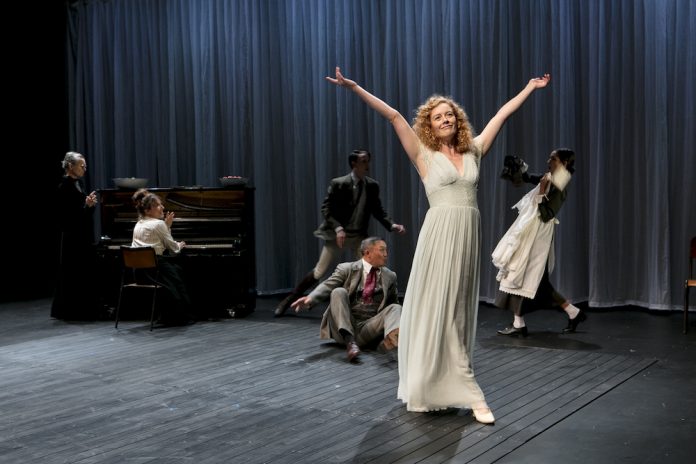My Brilliant Career
Written by Miles Franklin
Adapted by Kendall Feaver
Directed by Kate Champion
Belvoir Street Theatre
December 5, 2020 – January 31, 2021
In her illuminating and dynamic stage adaptation of Miles Franklin’s My Brilliant Career writer Kendall Feaver has included material from further afield than the original, drawing on My Career Goes Bung, Franklin’s childhood memoirs and biographical studies. Consequently, we have a fuller and deeper impression of Sybylla Penelope Melvyn, an appealingly provocative character, created by the 19-year-old Stella Franklin, and which, while located in personal experience, far transcends it.
Happily and disarmingly, Sybylla (an exuberant Nikki Shiels) confesses to the audience that she is very much concerned with “me” – that is, in constructing a female narrator – and placing her in a world that is “real”. Throughout the play, the characters are at times reflected in mirror which doubles as a blacked out window suggesting that while they are what Franklin might call “local material” they are also fictional characters who exist to shed light on the narrator’s struggle to achieve self-determination in an unbending world of male power and wealth-based opportunity.
Energised by a sense of her own potential, Franklin’s Sybylla desperately wants to make her mark upon the world, whether as a “journalist, singer, actress, politician”. Given the crushing impoverishment of her family’s circumstances – so well evoked in the stage setting and costumes (Robert Cousins) – how likely is it that she can fulfil her appetite – note her consumption of fruit – for a more intellectually and artistically fulfilling life? The horrible background screams of her mother (Blazey Best) in labour and the delivery of yet another child doesn’t so much illicit sympathy from Sybylla as rage at the lack of human control over human destiny.
As she sees it, we don’t ask to be born, we can’t choose the socio-economic circumstances we are born into, we can’t design our own mental or physical attributes nor can we be gentle and submissive when we have opinions and need to declare them. With good humour but nevertheless some hurt, she laments her lack of prettiness (its importance emphasised through projection of her image onto the billowing drapes of a better life) and sardonically regrets being intelligent as both are barriers to the one avenue of escape from a life of drudgery – marriage with a man of substance. Despite these self-deprecating drawbacks, the uninhibited Sybylla is quite capable of attracting the attention of men, including the wealthy landowner Harry Beecham (Guy Simon). When eventually Harry can offer her affection and position Sybylla faces a very significant challenge to her sense of selfhood.
Kate Champion’s direction makes Sybylla’s lack of autonomy painfully clear. Her mother’s entrance, arms akimbo, heralds decisions made without reference to Sybylla and demonstrating her total power over the body of her daughter. She must leave Possum Gully and go into service as a maid-of-all-work. She must leave Caddagat, her grandmother’s home and cultural Eden, to work as a “governess” to the rich but dirty and illiterate McSquats in payment for her father’s debt. She must stay at home and support the family whereas her brother can leave seeking a better life. While at Caddigat her body is attired or put on show in a gown chosen for her and reminiscent of Iphigenia in Aulis, with the intention of transforming her into a wife. Throughout the play, she is almost constantly in motion, jumping, running and literally rocking boats, her own body seeming to rebel against its restrictive environment.
It is only in the last scene that we see Sybylla really at rest – using the one hour she has to herself from her chores – sitting on the floor and writing in her precious notebook. In the background her mother, persuaded by Sybylla, hesitantly plays the piano which has been a constant presence on the stage and a metaphor for the fuller life Sybylla imagines herself living. Perhaps the fuller life that everyone imagines for themselves in view of the McSquat’s enthusiasm for the piano, and which can be ruthlessly squashed in those denied the power to access it. As affirmation, and a lovely touch, the blackened window is suffused with light.
The Sydney Morning Herald (September 1901) condemned Sybylla as “bold, forward, and selfish … the sort of girl that is happily rare in Australia”. Ironically, Sybylla became an icon of the 70s feminist movement and in this brilliant production she extends her partisanship to any individual struggling against restrictive attitudes and systems that refuse them a voice.





